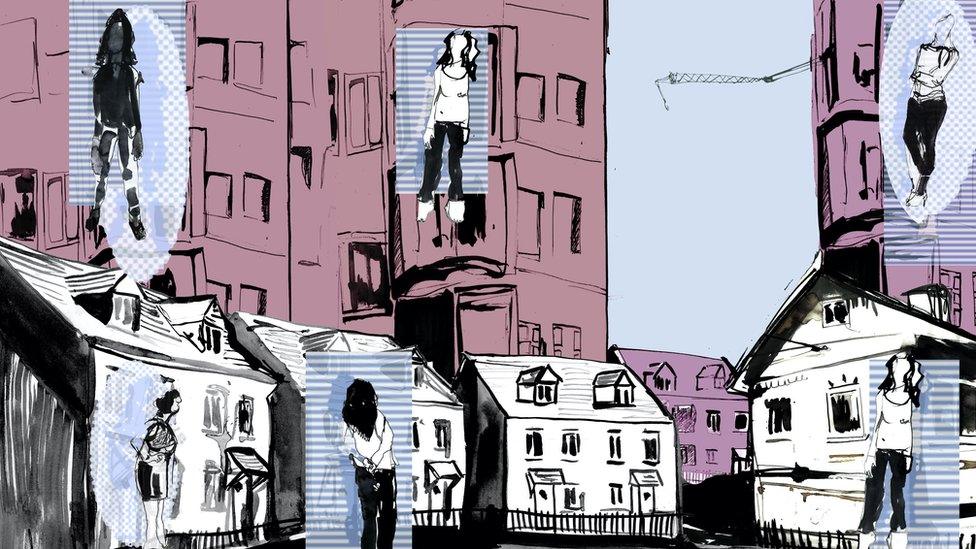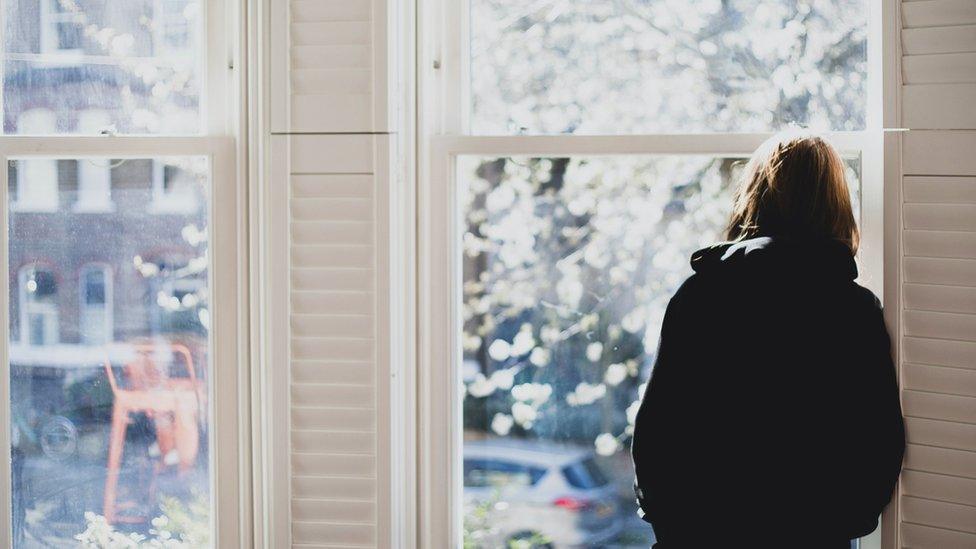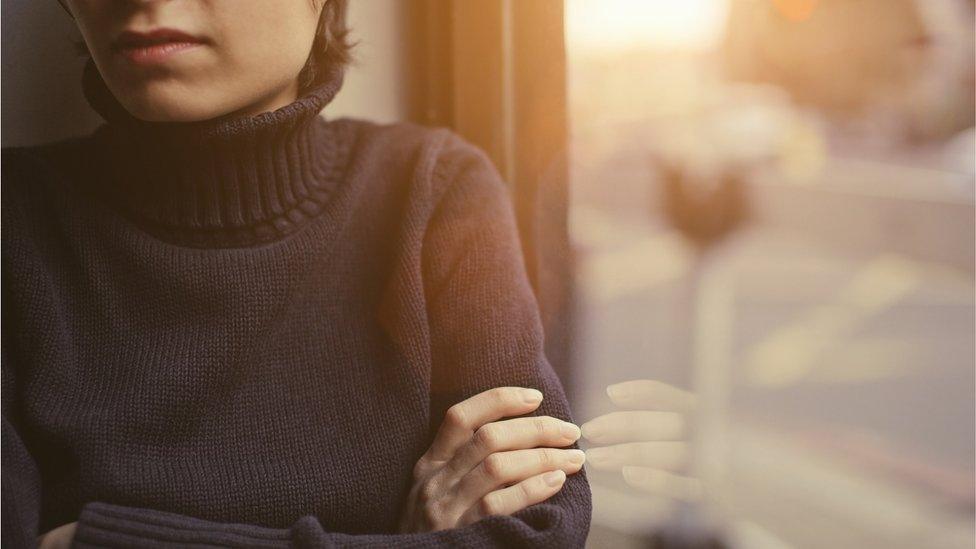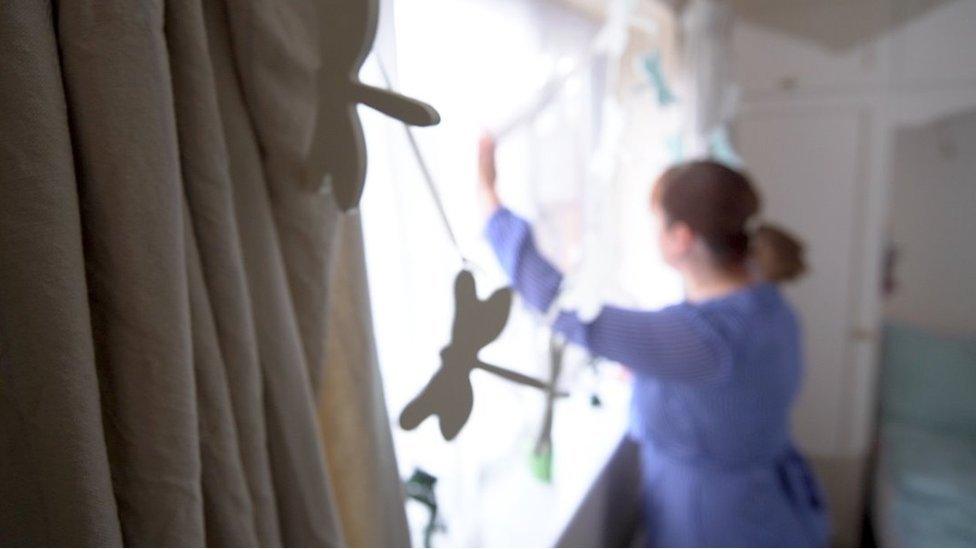Domestic abuse: Women 'could die in unregulated refuges'
- Published

Domestic abuse support groups have warned that women will be unsafe if unregulated refuges are allowed to continue offering accommodation.
One organisation said "women could die" if the practice does not stop.
They fear the government's Domestic Abuse Bill could see private landlords offering rooms for vulnerable women fleeing violence.
The government said it was introducing a new legal duty for councils to provide safe accommodation.
Those working in the domestic abuse support sector say the bill - which is going through Parliament - could allow people with no expertise in such cases to compete for funding to provide accommodation.
This could lead to more victims being placed in unsafe housing, the groups said.
The word refuge isn't mentioned in the Domestic Abuse Bill, only "relevant accommodation". Charities want a definition included for what a specialist refuge service should be, or a set of standards by which providers have to abide.
'Risk of harm'
Lucy Hadley from domestic abuse charity Women's Aid said: "You cannot just set these services up on the cheap, and without the experience and expertise and quality that a specialist woman's refuge, like a Women's Aid member service would have.
"We're really worried that in those circumstances the actual place, the housing, is unsafe for women and children to be in - but also that they will not see that as a suitable option for them and they may well return to the perpetrator that puts them at further risk of harm."
Examples of this include hostels being opened in places with high rates of anti-social behaviour and criminal activity, which the charities say leave women vulnerable to exploitation.

For information and support on domestic abuse, contact:
Police: 999 press 55 when prompted if you can't speak
Refuge UK-wide 24-hour helpline: 0808 2000 247
Welsh Women's Aid Live Fear Free 24-hour helpline: 0808 80 10 800
Scotland National Domestic Abuse and Forced Marriages 24-hour helpline: 0800 027 1234
Northern Ireland Domestic Abuse 24-hour helpline: 0808 802 1414
Men's Advice Line 0808 801 0327
Online web chats and text services are also available.

Fiona Dwyer, chief executive of women's organisation Solace, said: "We've already seen in one case in Birmingham where a woman was murdered by her perpetrator when they were both living in the same so-called refuge."
She warned unregulated spaces provided by groups with no expertise could be dangerous and that "more women could die".
It comes amid a massive increase in appeals for help over the past year from people suffering domestic abuse, which campaigners have said exposes the scale of the problem.

Zara (not her real name) said her former partner "tried to control everything"
For the past few months Zara (not her real name) has been living in a refuge run by Solace in the south of England. She left her violent partner in 2020 after experiencing more than a decade of abuse.
"He tried to control everything and completely broke me - what I wore, who I spoke to, where I went. He would pull my hair, strangle me and there was sexual violence too: he'd pin me down and rape me."
Now she says she finally feels safe - but the refuge does not only provide her with a secure and secret place to live.
Staff there are trained to help women find permanent accommodation as well as how to help with family court issues and applying for benefits. They can provide solicitors and offer counselling too.
Refuges are partly funded by the housing benefit received by the women living there.
Campaigners call the trend of outside organisations offering properties for victims "rent-farming". Once they are set up as "exempt" accommodation providers, a category of supported housing in which landlords have to provide care or support, they are eligible for higher housing benefit rates.
"Many of the rent farmers are doing it because they get huge profits… so they're essentially profiting out of really vulnerable people," said Ms Dwyer.
'Wild West'
Jess Phillips, shadow minister for domestic violence and safeguarding, said: "I call it the Wild West because there is literally no regulation to stop any landlord buying up a property today and... whacking that house full of a random selection of vulnerable people... and charging the taxpayer five times more."
She said she tried to get a definition of "safe accommodation" included in the bill but the government rejected it.
The Domestic Abuse Bill covers England and Wales, but the duty on local authorities to provide support and funding for victims of domestic abuse only applies in England. The issues it focuses on are devolved matters for Scotland and Northern Ireland.
When it becomes law, the bill will place a legal duty on councils to fund what it calls "relevant accommodation" for victims of domestic abuse and their children.
And while Women's Aid welcome this, they say it does not go far enough.
"The new duty on local authorities to fund support for survivors could be a real step forward in tackling the funding crisis that specialist women's refuges are currently facing," said Lucy Hadley.
"But it doesn't have any expectation about the types of organisation that can deliver this support.
"It doesn't make clear that they should be women's organisations that have expertise and knowledge and experience in supporting survivors of domestic abuse."
'Unprecedented support'
In a statement, the Ministry of Housing, Communities and Local Government said it had provided "unprecedented support" throughout the pandemic "to help the most vulnerable in society".
"We are introducing a new legal duty on councils to provide support for domestic abuse victims and their children within safe accommodation, including refuges, and backed by £125m to ensure services are available to all," they said.
In the meantime, Zara said there is no way she could have got her life back on track without the full wrap-around support and services from Solace.
"I wouldn't have been able to do it," she said. "I had no-one, literally no-one to support me or help me. You can't do it on your own - it's impossible."
Listen to more on this issue on Newscast on BBC Sounds
Related topics
- Published23 March 2021

- Published23 July 2020
